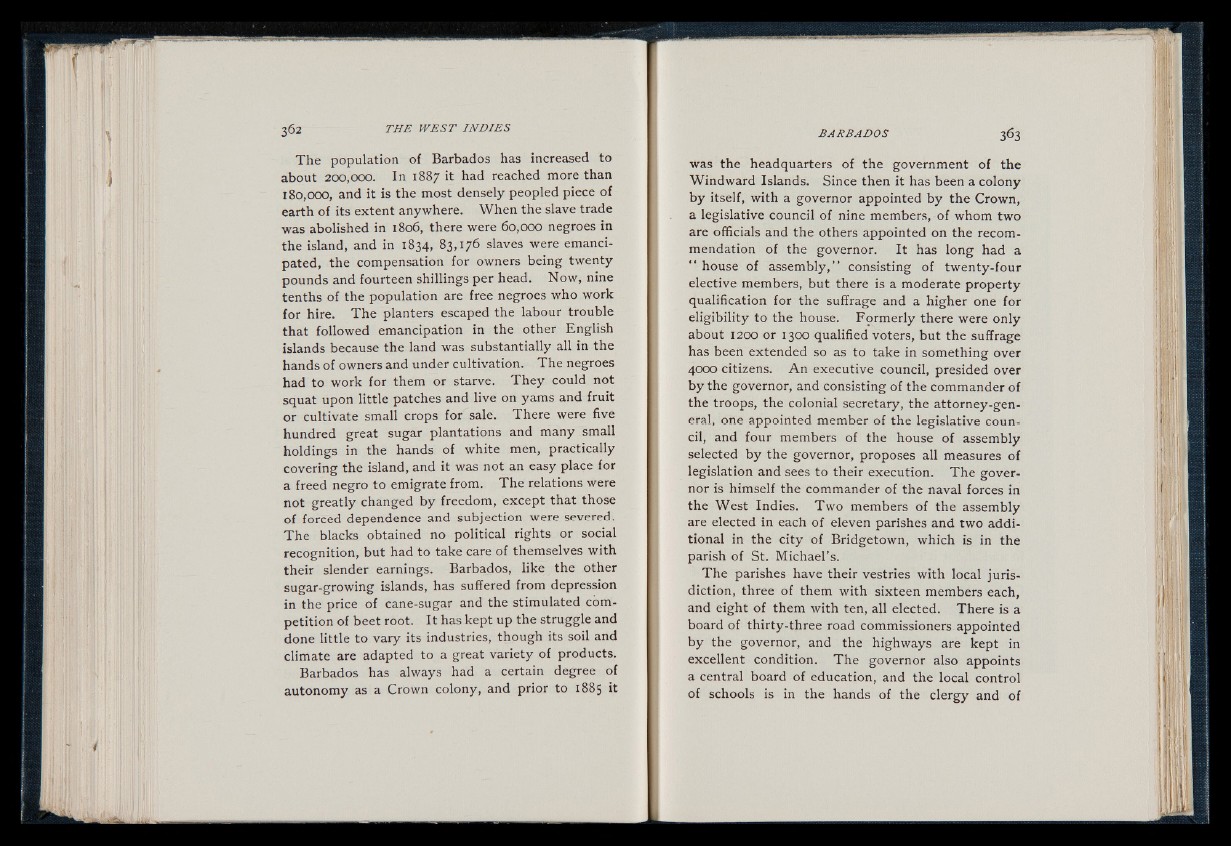
T he population of Barbados has increased to
about 200,000. In 1887 it had reached more than
180,000, and it is the most densely peopled piece of
earth of its extent anywhere. When the slave trade
was abolished in 1806, there were 60,000 negroes in
the island, and in 1834, 83,176 slaves were emancipated,
the compensation for owners being twenty
pounds and fourteen shillings per head. Now, nine
tenths of the population are free negroes who work
for hire. T he planters escaped the labour trouble
that followed emancipation in the other English
islands because the land was substantially all in the
hands of owners and under cultivation. The negroes
had to work for them or starve. T h e y could not
squat upon little patches and live on yams and fruit
or cultivate small crops for sale. There were five
hundred great sugar plantations and many small
holdings in the hands of white men, practically
covering the island, and it was not an easy place for
a freed negro to emigrate from. The relations were
not greatly changed by freedom, except that those
of forced dependence and subjection were severed.
T h e blacks obtained no political rights or social
recognition, but had to take care of themselves with
their slender earnings. Barbados, like the other
sugar-growing islands, has suffered from depression
in the price of cane-sugar and the stimulated competition
of beet root. It has kept up the struggle and
done little to vary its industries, though its soil and
climate are adapted to a great variety of products.
Barbados has always had a certain degree of
autonomy as a Crown colony, and prior to 1885 it
was the headquarters of the government of the
Windward Islands. Since then it has been a colony
by itself, with a governor appointed by the Crown,
a legislative council of nine members, of whom two
are officials and the others appointed on the recommendation
of the governor. It has long had a
“ house of assembly,” consisting of twenty-four
elective members, but there is a moderate property
qualification for the suffrage and a higher one for
eligibility to the house. Formerly there were only
about 1200 or 1300 qualified voters, but the suffrage
has been extended so as to take in something over
4000 citizens. A n executive council, presided over
by the governor, and consisting of the commander of
the troops, the colonial secretary, the attorney-general,
one appointed member of the legislative council,
and four members of the house of assembly
selected by the governor, proposes all measures of
legislation and sees to their execution. The governor
is himself the commander of the naval forces in
the West Indies. Two members of the assembly
are elected in each of eleven parishes and two additional
in the city of Bridgetown, which is in the
parish of St. Michael’s.
T he parishes have their vestries with local jurisdiction,
three of them with sixteen members each,
and eight of them with ten, all elected. There is a
board of thirty-three road commissioners appointed
by the governor, and the highways are kept in
excellent condition. T he governor also appoints
a central board of education, and the local control
of schools is in the hands of the clergy and of